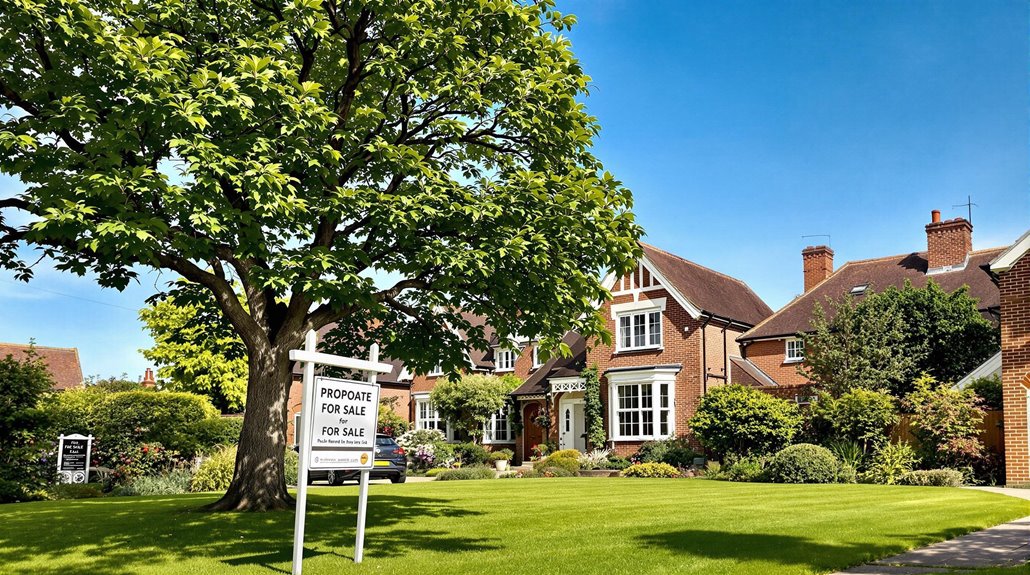I’ve helped countless families navigate probate, and one question always comes up: “How much will the valuation cost?” You’re looking at anywhere from $300 to $5,000, depending on your estate’s complexity. But here’s what most people don’t realize—you can greatly reduce these costs with the right strategies. I’ll show you exactly how to minimize probate valuation expenses and share the insider tips that could save your family thousands of dollars.
Key Takeaways
- Probate valuation costs range from $300-$800 for residential properties and $1,000-$5,000+ for commercial properties depending on complexity.
- California charges 0.1% of non-cash assets’ appraised value with a $75 minimum and $10,000 maximum fee cap.
- Total probate expenses typically consume 4-7% of an estate’s value, including appraisal fees and court filing costs.
- Establish a revocable living trust to bypass court-supervised appraisals and reduce overall probate valuation expenses significantly.
- Organize asset documentation beforehand and engage qualified appraisers to minimize administrative costs and prevent costly valuation mistakes.
What Are Probate Valuation Costs?
Probate valuation costs encompass the fees you’ll pay to determine the fair market value of a deceased person’s assets during estate administration. These expenses vary considerably based on your chosen valuation method and asset complexity.
You’ll encounter different pricing structures depending on your needs. Formal appraisals by certified professionals cost $300-$800 for residential properties, while commercial valuations range from $1,000-$5,000+. For budget-conscious executors, Comparative Market Analysis (CMA) offers a lower-cost alternative, and Automated Valuation Models (AVMs) provide the most economical digital estimates.
High-value estates often face percentage-based fees of 0.1%-0.3% of asset value. Rush services add 25%-50% premiums, and specialized assets like business interests or collectibles incur additional charges. The probate process can take several months to complete, which may impact your overall valuation costs as market conditions change during this extended timeframe. Understanding these cost factors helps you budget effectively for your estate administration responsibilities.
Typical Cost Range for Probate Valuation in California
California’s probate valuation costs follow a standardized fee structure that’s more predictable than most other states. I’ll break down what you can expect to pay for probate referee fees based on your estate’s value.
The fee is 0.1% of your non-cash assets‘ appraised value, with a $75 minimum and $10,000 maximum. Here’s what this means for different estate sizes:
- $100,000 estate: $100 fee
- $500,000 estate: $500 fee
- $1,000,000 estate: $1,000 fee
- $5,000,000 estate: $5,000 fee
- $15,000,000+ estate: $10,000 maximum fee
Keep in mind that these appraisal fees are just one component of total probate expenses, which typically range from 4% to 7% of an estate’s total value in California.
Factors That Affect Probate Valuation Expenses
While California’s standardized fee structure provides predictability, several factors can greatly impact your total probate valuation expenses beyond the basic referee fees.
Estate complexity drives costs considerably. If you’re dealing with multiple property types, businesses, or investment portfolios, expect higher appraisal fees and longer processing times. Complex assets require specialized expertise that commands premium rates.
Geographic location matters more than you’d think. Properties in high-cost areas like San Francisco or Los Angeles face steeper appraisal fees due to local market conditions and higher professional service rates.
Disputes escalate expenses quickly. When beneficiaries challenge valuations or creditors contest claims, you’ll face additional court hearings and extended attorney involvement. These complications can double or triple your initial cost projections, making early resolution discussions worthwhile. Estate size directly correlates with management complexity, requiring more extensive documentation and professional oversight throughout the valuation process.
How Probate Valuation Fees Are Structured
Understanding how probate valuation fees are structured helps you budget accurately and avoid financial surprises during estate administration. I’ll break down the main fee structures you’ll encounter.
Most attorneys use percentage-based fees, typically ranging from 3% to 7% of your estate’s total value. These often follow sliding scales—you might pay 4% on the first $100,000, then 3% on the next $100,000. Some states like California have statutory percentage requirements.
Flat fee agreements provide cost certainty upfront, though they’re less common for full probate administration. Hourly rates offer transparency but unpredictable totals. These fee agreements serve as legal documents that outline compensation terms and provide essential legal protection for both attorneys and clients throughout the probate process.
You’ll also face mandatory costs: appraisal fees (~0.1% of asset value), court filing fees ($435 in California), publication fees ($100-$200), and potential executor compensation.
Court-Appointed Probate Referees Vs Private Appraisers
Beyond understanding fee structures, you’ll need to choose between court-appointed probate referees and private appraisers for your estate valuations. Here’s what you should know: court-appointed probate referees charge a fixed 0.1% of appraised value with a $75 minimum, while private appraisers set negotiable rates that often exceed statutory fees.
I recommend sticking with probate referees for court-supervised matters—they’re required anyway and offer significant cost savings. Their expertise spans all asset types, and courts accept their valuations without question. You can’t waive them without a formal hearing, which adds unnecessary expense.
Reserve private appraisers for non-probate situations like trust administrations where you need specialized expertise and aren’t bound by court requirements. Keep in mind that the probate process can take years to complete, making cost considerations even more important for your estate planning decisions.
Ways to Reduce Your Probate Valuation Costs
Since probate valuation costs stem from the assets that enter your estate, the most effective strategy involves keeping assets out of probate entirely. I’ll share five proven methods that work for families like yours.
First, establish a revocable living trust. Your assets transfer directly to beneficiaries without court-supervised appraisals, maintaining privacy while eliminating valuation costs. This approach can significantly reduce estate fees associated with probate.
Second, optimize beneficiary designations on retirement accounts, life insurance, and bank accounts. These transfer automatically, bypassing probate completely.
Third, implement lifetime gifting strategies. Annual tax-exempt gifts reduce your estate size, potentially qualifying you for simplified procedures.
Fourth, structure joint ownership with right of survivorship. Assets transfer immediately upon death.
Finally, keep estates below Texas’s $75,000 threshold through strategic planning, qualifying for affidavit-based transfers without formal appraisals. Remember that organizing your assets and documents beforehand can enhance efficiency and reduce administrative costs throughout the entire process.
Avoiding Probate Entirely to Save Money
While reducing probate valuation costs helps, you’ll achieve the greatest savings by avoiding probate entirely. I recommend establishing a revocable living trust to transfer your assets outside probate court. You can also use transfer-on-death deeds for real estate and designate payable-on-death beneficiaries for financial accounts.
By avoiding probate, you’ll eliminate court-mandated executor fees that typically cost 2-4% of your estate value. You’ll also skip attorney fees, publication costs, and appraisal expenses tied to court supervision. Americans spend $2 billion annually on avoidable probate costs.
Beyond saving money, you’ll reduce the average 570-hour executor workload and accelerate asset distribution to your beneficiaries. Just remember to keep beneficiary designations updated and properly fund your trusts to guarantee effectiveness. A comprehensive estate plan is essential for protecting loved ones and ensuring your wishes are fulfilled.
Common Mistakes That Increase Valuation Expenses
Even if you can’t avoid probate entirely, you can still protect yourself from unnecessary expenses by steering clear of costly valuation mistakes. I’ve seen families pay twice for the same appraisal because they initially tried DIY valuations on complex assets like antiques or artwork. Don’t rely on tax assessments—they’re often outdated and won’t hold up in court. Additionally, understanding the Land and Buildings Transaction Tax can help you budget more effectively for property-related expenses.
Start documenting valuable items now with photos and detailed descriptions. This prevents confusion later and reduces the need for extensive detective work. Budget for professional appraisals upfront rather than scrambling when the court demands them. Using inappropriate valuation methods or skipping formal appraisals altogether triggers expensive corrections and penalties. These mistakes extend probate timelines, multiplying your administrative costs when you’re already dealing with loss.
Remember that market conditions constantly change, so relying on outdated property information can lead to inaccurate assessments that require costly corrections.
Why Accurate Valuation Matters for Your Estate
Getting your estate’s valuation right isn’t just about numbers on paper—it’s the foundation that determines whether your final wishes get carried out smoothly or turn into a costly nightmare for your loved ones.
Here’s what’s at stake: probate courts handle over $60 billion in estate assets annually, and every dollar matters. When I see families dealing with inaccurate valuations, they’re facing prolonged legal battles, unexpected tax penalties, and bitter disputes that tear relationships apart.
You need precise valuations to satisfy court requirements, minimize estate taxes, and guarantee fair distribution among heirs. Undervalue assets, and you’ll face IRS penalties. Overvalue them, and you’ll pay excessive taxes. Professional expertise from qualified appraisers ensures these costly mistakes are avoided from the start. Most importantly, accurate valuations prevent the kind of family conflicts that destroy legacies you’ve worked your entire life to build.
Conclusion
I’ve shown you that probate valuation costs don’t have to drain your estate’s value. You can greatly reduce expenses by establishing a living trust, organizing your documents early, and choosing the right appraiser for your needs. Don’t let poor planning inflate these costs unnecessarily. Take action now to protect your beneficiaries from excessive fees. Remember, every dollar you save on probate costs is another dollar that goes to your loved ones.
References
- https://www.clearestate.com/en-us/blog/california-probate-fees
- https://familybrief.org/blog-feed/
- https://www.ocelderlaw.com/probate-attorney-cost
- https://www.courts.michigan.gov/4a4a11/siteassets/publications/manuals/msc/miappopmanual.pdf
- https://smartasset.com/estate-planning/probate-costs-in-california
- https://learning-center.wills.com/how-much-does-probate-cost/
- https://crestsurveyors.co.uk/what-is-a-probate-valuation/
- https://www.appraiseitnow.com/blog/top-5-factors-to-consider-in-probate-appraisal-for-real-estate
- https://www.weareatticus.com/articles/how-much-does-probate-cost
- https://www.apassociates.org/probate-house-value-understanding/




